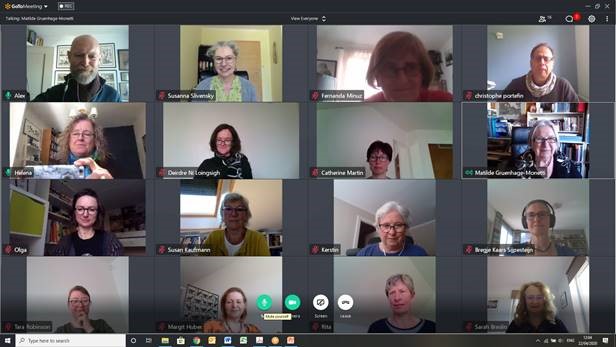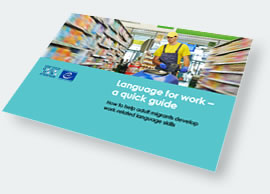Latest articles
05.05.2020
Language for Work training and consultancy begins
In December 2019, the European Centre for Modern Languages (ECML) accepted requests from four ECML member states (Germany, Ireland, the Netherlands, and Sweden) for training and consultancy support by the Language for Work (LfW) team to take place in autumn 2020.
The LfW team then agreed to meet for two days in April 2020 at the headquarters of the ECML in Graz to initiate the LfW Training and Consultancy (T&C) offer. The first day (21 April) would be for the ECML secretariat to brief the LfW team. The second day (22 April) would be for the LfW team to meet the representatives from the four ECML member states who would act as local coordinators of the LfW T&C events in their own countries.
Little did we know then that COVID-19 lockdowns would completely upend our much-looked-forward-to plans for that springtime meeting in Graz… Instead we found ourselves, each in his or her own country, sitting at home in front of the computer for an internet-enabled virtual meeting. We are very happy to report that this ‘remote’ format still allowed for a very productive meeting.
The overall aim of both days was to create a common understanding of the LfW T&C offer: its structure and conditions, and the roles and tasks of the LfW team, its event moderators (i. e. the team members responsible for carrying out the different events), and the local coordinators (i.e. the point-of-contact coordinators and any relevant colleagues).
On the first day, as originally planned, the ECML secretariat briefed the LfW team. On the second day, the meeting focused more specifically on the agreed LfW T&C events in Germany, Ireland, the Netherlands, and Sweden. The local coordinators explained the context in their various countries regarding work-related L2 provision and rationale for training and consultancy from the LfW team. The type of event to be organised and the expertise requested from the LfW T&C moderators were discussed and a number of issues clarified, in relation to dates, venues, participant numbers and profile, etc. Bilateral consultations between the LfW T&C team and the local coordinators were initiated to take further concrete steps for each event.
The discussions were extremely informative and stimulating, certainly since the local coordinators and other partners are all experienced and committed LfW professionals. They expressed the wish to contribute to the events with their expertise and share the results.
In spite of the structural differences in migration and labour market policies in the various countries, common issues for the T&C events emerged:
- How to conceptualise the cooperation between different actors in education, for example second language teachers and VET teachers or between educationalists (language teachers and providers) and employers and/or labour market administrations.
- How to create sustainable support for workplace learning.
- How to support migrants with limited or no literacy.
Will the events take place as planned? Only time will tell, but we will be busy preparing for them over the next few months anyway and we’ll certainly keep you informed in the meantime.
Bleiben Sie gesund!
The LfW T&C team

23.04.2020
World Book Day (23 April): explore the digital collection of the ECML!
23.03.2020
New ECML publication: Communicating with migrants - Guide for staff in job centres and public services
Communication is key to the effective delivery of public services, but it can be challenging for many reasons. Where clients have limited spoken and/or written skills in the majority language and different cultural perspectives, these challenges are all intensified.
Fortunately, there are concrete things you can do to address these challenges. This leaflet offers strategies and practical tips for managers to help staff support clients with limited language skills. And it offers help for all staff to reflect on communication styles used in today’s increasingly culturally and linguistically diverse working context.
The guide is available in the following languages: български - English - Español - Français - Gaeilge - Nederlands - Norsk - Pусский - Svenska
